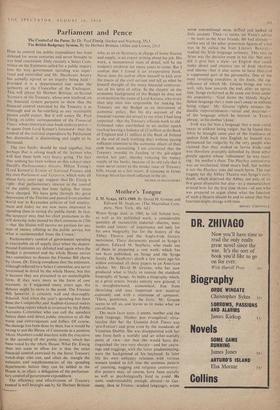Parliament and Pence
The Control of the Purse. By Dr. Paul Einzig. (Seeker and Warburg. 35s.) The British Budgetary System. By Sir Herbert Brittain. (Allen and Unwin, 25s.)
Flow to control the public expenditure has been debated for seven centuries and never brought to any final conclusion. Only recently a Select Com- mittee on the Estimates called for a public inquiry into the way government spending was super- vised and controlled and Mr. Heathcoat Amory has actually agreed to an inquiry being held— provided it is a departmental one under the authority of the Chancellor of the Exchequer. This. will please Sir Herbert Brittain, ex-Second Secretary of the Treasury, whose new textbook on the financial system purports to show that the financial control exercised by the Treasury is as thorough and as far-reaching as any reasonable person could expect. But it will annoy Dr. Paul Einzig, ex-lobby correspondent of the Financial Times, whose historical case-book seeks to prove— to quote from Lord Kennet's foreword—that the control of the national expenditure by Parliament has diminished, is diMinishing and ought to be increased.
The two books should be read together. but perhaps that is asking much of the layman who will find them both very heavy going. The fact that nothing has been written on this subject since Durell's Parliamentary Grants, Hilton Young's (Lord Kennet's) Sy■tem of National Finance and .My own Parliament and TaxpnVer, which were all about forty years ago. suggests that Dr. Einzig is right—that parliamentary interest in the control of the public purse has been fading. But times have changed. We have gone through the great • depression of the Thirties and passed from another world war to Keynesian policies of full emptoy- ment and today we are now more interested in spending than in saving the public funds. In fact. the taxpayer may find his chief protection in the self-denying order passed by the Commons in 17(16 —that 'the House will receive no petition for any sum of .money relating to the. public service but what is recommended from the Crown.' . Parliamentary control of government spending is exercisable on all supply days when the depart- mental Estimates are debated and again when the Budget is presented and the whole House moves - into committee to discuss the Finance Bill clause by clause. Dr. Einzig complains that the estimates, although referred to a Select Committee,are never scrutinised in detail by the whole House, but this is because they are presented in an unintelligible form. if they were . more in the form of cost . accounts, as I suggested many years ago, the debates might be more to the point. The Finance Bill, however, is certainly well and thoroughly debated. And when the year's spending has been done the'Comptrollerand.Auditor-General makes a searching report which is reviewed by the Public ' AcCounts Committee who can call the spenders before them and direct public attention to all the Waste and extravagances and follies. Of course, the damage has been done by then, but it would be
• wrong to put the House of Commons in a position where Members could interfere with the executive in the- spending of the public money which has • been voted by -the whole. House. Whar Dr. Einzig - does not- seem to allow for is that the strict financial control exercised by the fierce Treasury • watch-dogs who can, and often do, mangle the estimates and supplementaries of the spending departments before they can be tabled in the House is, in effect, a delegation of the parliamen- tary control of government expenditure.
The efficiency and effectiveness of Treasury • control is well brought out, by Sir Herbert Brittain who, as an ex-Secretary in charge of home finance and supply. is an expert writing about his job. His work, a monumental mass of detail, will be the student's textbook for many years to come. But I confess that I found it an exasperating book. Never does the author allow himself to kick over the traces of the civil servant and tell us what he himself thought of the many financial controver- sies of his term of office. In the chapter on the economic background of the Budget he does not even mention the name of Lord Keynes, who more than any man was responsible for making the Treasury use the Budget as an instrument of economic policy. But his dry account of the financial routine did Gcveal to me what I had long suspected—that the Treasury officials work to old- fashioned rules established in an earlier epoch (such as leaving a balance of £2 million at the Bank of England and LI million at the Bank of Ireland at the end of each working day) without paying sufficient attention to the economic effects of their cash book accounting. I am convinced that the Treasury overdid its funding in` the gilt-edged market last year, thereby reducing the money supply of the banks, because of its old rule that it must never resort to the tender issue of Treasury hills, except as a last resort, if someone in Great George Street has smelt inflation in the air.
NICHOLAS DAVENPORT


































 Previous page
Previous page